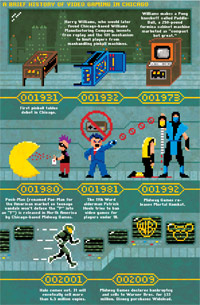In 1991, a University of Chicago student named Alex Seropian started a video game company in his basement apartment on Hyde Park Boulevard. He called the company Bungie, and, in between studying for his math major, copied discs and assembled the packaging for its first game, Operation Desert Storm.
Fast forward 18 years. Seropian is the name behind one of the highest grossing video game series in history, and he’s just sold his latest company, Wideload, to Disney. In doing so, he has introduced the family-friendly giant to Chicago’s video game industry. “It couldn’t happen at a better time,” says Eric Nofsinger, the chief creative officer at another game developer, Hoffman Estates–based High Voltage Software. “The recession has impacted sales, even in games which were perceived as somewhat recession-proof.”
Seropian, 40, has a knack for starting video game companies and selling them to major corporations. In 2000, Microsoft bought Bungie for an undisclosed sum and moved its staff to Seattle. Seropian’s first-person shooter game Marathon became the rudimentary predecessor to Halo, the first flagship title that Microsoft released for its Xbox console game system. The game (and its sequels) went on to gross $1 billion.
Seropian moved to Seattle, but by 2003 he had returned to Chicago to raise a family. Ultimately, he started a new company, Wideload, only to sell it to Disney this past fall for an undisclosed sum. You might think the guy behind the intergalactic carnage of Halo would have little in common with Disney, the company behind the mouse. But Seropian had become a father—he now has three children, ages six, four, and two—and he had begun weighing a less violent approach in his work. “I’ve always thought about making games for chumps like myself,” says Seropian, “but that meeting was right around when I started having kids, and I started thinking about, gee, what does it mean for me now, getting older, having kids, having a family, and yet still playing games?”
Seropian began to reconsider the usual gaming topography of machine guns and rocket launchers. “We had a game concept called Sniper, where the whole game is you in the top of a tower with a sniper rifle killing people. Hey, people love sniping, that could be fun! But we also had another concept that was, um, not killing people with headshots.” He laughs. “Let’s have a broader game where the point is teaming up with other players. The more you do that, the bigger the advantage you get. Which one do I want to play with my kids? The second one.”
As Disney’s vice president of worldwide creative, Seropian will oversee six development studios, including the 25-employee Wideload team, which is staying in Chicago. While he assumes his duties in California, he’ll also retain his position as game-designer-in-residence at DePaul University’s College of Computing and Digital Media, splitting his time between Chicago and the West Coast.
“This is a big difference for me careerwise,” he says. “It’s interesting to be able to continue to focus on making original games and doing it in this independent-minded way, yet having the support of a multibillion-dollar organization that has a multimarket capability to take ideas not just to video games but to film, to theme parks, to movies, et cetera.”
The Disney sale is just the latest news for Chicago’s video game industry, which has seen recent years of high scores, pauses, and restarts. Electronic Arts shuttered its Chicago studio in 2007. Midway Games, the venerable West Side developer and publisher responsible for such arcade magic as Pac-Man, Defender, and the Mortal Kombat franchises, declared bankruptcy in February, with Warner Bros. buying most of the company’s assets for $33 million plus liability assumption.
“Warner Brothers is in Chicago now after buying Midway, and there’s Robomodo and Day 1 Studios, which are getting to be larger developers, and now there’s a community,” Seropian says. “That’s how Silicon Valley grew—not saying that Chicago’s going to be the next Silicon Valley of games, but that’s how it starts. It’s a really good thing for game development in Chicago.”
Illustration: Jude Buffam



